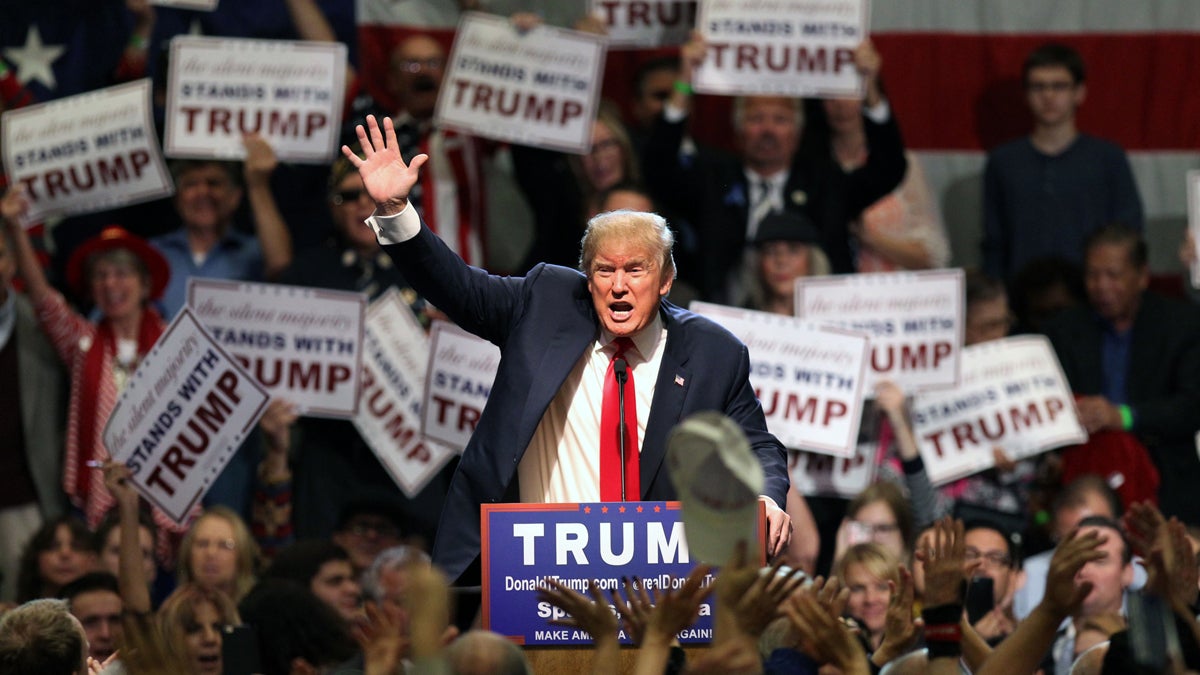The Trump temptation and the seeds of autocracy

Republican presidential candidate Donald Trump gestures as he speaks during a rally at the Nugget Convention Center in Sparks, Nev., Thursday, Oct. 29, 2015. (AP Photo/Lance Iversen)
A respected political analyst is writing about a certain presidential candidate. See if you can identify the candidate.
He used simple, straightforward language that ordinary people could understand, short sentences, powerful emotive slogans.
Starting to sound familiar, right?
There were no qualifications in what he said. Everything was absolute, uncompromising, irrevocable, undeviating, unalterable, final. He seemed to express [the voters’] deepest fears and desires. Increasingly, too, he exuded self-confidence, aggression, belief in [his] ultimate triumph, [with] a fervor that was hard for less demagogic politicians to emulate. [He] managed to project an image of strong, decisive action, dynamism, energy.
It sure sounds like Donald Trump, America’s top 2015 phenomenon. His whole pitch, after all, is that we’re a bunch of losers and he’s an absolute winner, strong, decisive, dynamic, high-energy …. Oh wait!
Those italicized remarks refer to German presidential candidate Adolf Hitler.
For the record, I am not suggesting that Trump is Hitler; or that America on the eve of 2016 is like Germany on the cusp of Hitler’s ascent in 1933. Pre-Nazi Germany was not steeped in two centuries of democratic tradition. Pre-Nazi Germany had lost a world war, at a cost of 1.7 million dead. Pre-Nazi Germany was racked by economic chaos that would be unimaginable in America today; at the height of hyperinflation, people literally pushed wheelbarrows of currency down the street, and the jobless rate in Berlin sometimes hit 50 percent. And Hitler, the aspiring candidate, was highly programmatic; he’d detailed his hate agenda in “Mein Kampf” nearly a decade earlier, whereas Trump simply riffs in the moment. He does policy improv whenever he runs his mouth.
But right now, as we prepare for nearly a year of balloting, we’re in danger of embracing a very American version of autocracy. Our kind of autocrat doesn’t need a jackboot army of street thugs; all he needs is an instinctive genius for exploiting rampant discontent (especially within the white downscale Republican electorate), and a silver tongue that is catnip for the ubiquitious instatiable media.
Ar the top of this post, I quoted Richard J. Evans, the distinguished British historian and author of “The Coming of the Third Reich.” Some of the passages are downright creepy, because they resonate so disturbingly. German voters in the early ’30s were fed up with conventional politics as usual — they viewed the government as gridlocked and ineffectual — and many were drawn to Hitler because he “advertised [his] opposition to conventional politics.” The voters, writes Evans, “were not really looking for anything concrete [from Hitler]. They were, instead, protesting against the Weimar Republic.”
In addition, “many of them, particularly in rural areas, small towns, culturally conservative families … may have been registering their alienation from the cultural and political modernity for which the Republic stood.” Hitler was often vague about exactly what he wanted to do — he preferred “simple slogans” and “frenetic, manic activity” — and “to a large extent this allowed people to read into [him] what they wanted to and edit out anything they might disturbing.”
Which is one reason why Trump gets away with disgorging his garbage — because his followers either focus on the stuff they like and edit out the garbage; or they endorse the garbage. And Trump’s critics are continually stumped and amazed that this keeps happening.
All of which sounds eerily familiar. Evans writes that Hitler’s political opponents “still found it impossible to take [his] extremist rhetoric and bullying tactics … as anything other than evidence of [his] inevitable political marginality. [Hitler] did not confirm to the accepted rules of politics, so [he] could not expect to be successful.”
But what an aspiring autocrat needs most is a climate of despair, something visceral to exploit. And what we have today, particularly within a subset of the Republican electorate, is fear and anger and a yearning to lash out. These voters are terrified that America is changing for the worst, and that they’re being left behind, culturally and economically. Trump speaks to those terrors (“we don’t win anymore”) — the same kind of terrors that gripped Hitler’s voters, according to Evans:
“Money, income, financial solidity, economic order, regularity and predictability … now all this seemed to have been swept away …. It added to a feeling in the more conservative sections of the population of a world turned upside down.” And this fear and anger “debased the language of politics” and “lent new power to stock fantasy images of evil.”
Which is why Trump suffers no penalty for debasing Muslims, women, journalists, blacks, Asians, and the disabled. Thirty five percent of the Republican electorate still pledges fealty, and that’s a sizeable share if all his saner foes keep divvying the rest of the pie.
But do we really want to flirt with autocracy? Are we not better than our basest instincts? The voting begins on Feb. 1. The choice is ours.
—
This morning, on WHYY’s “Radio Times,” I did a year-end review and a look-ahead to ’16, co-guesting with foreign affairs columnist Trudy Rubin. The show is archived here.
—
Follow me on Twitter, @dickpolman1, and on Facebook.
WHYY is your source for fact-based, in-depth journalism and information. As a nonprofit organization, we rely on financial support from readers like you. Please give today.

